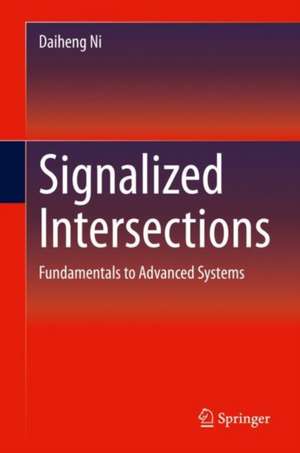Signalized Intersections: Fundamentals to Advanced Systems
Autor Daiheng Nien Limba Engleză Hardback – 28 feb 2020
| Toate formatele și edițiile | Preț | Express |
|---|---|---|
| Paperback (1) | 365.05 lei 38-44 zile | |
| Springer International Publishing – 28 feb 2021 | 365.05 lei 38-44 zile | |
| Hardback (1) | 384.45 lei 38-44 zile | |
| Springer International Publishing – 28 feb 2020 | 384.45 lei 38-44 zile |
Preț: 384.45 lei
Nou
Puncte Express: 577
Preț estimativ în valută:
73.57€ • 79.89$ • 61.80£
73.57€ • 79.89$ • 61.80£
Carte tipărită la comandă
Livrare economică 19-25 aprilie
Preluare comenzi: 021 569.72.76
Specificații
ISBN-13: 9783030385484
ISBN-10: 3030385485
Pagini: 335
Ilustrații: XV, 335 p. 268 illus., 251 illus. in color.
Dimensiuni: 155 x 235 x 21 mm
Greutate: 0.73 kg
Ediția:1st ed. 2020
Editura: Springer International Publishing
Colecția Springer
Locul publicării:Cham, Switzerland
ISBN-10: 3030385485
Pagini: 335
Ilustrații: XV, 335 p. 268 illus., 251 illus. in color.
Dimensiuni: 155 x 235 x 21 mm
Greutate: 0.73 kg
Ediția:1st ed. 2020
Editura: Springer International Publishing
Colecția Springer
Locul publicării:Cham, Switzerland
Cuprins
Intersection Control.- Warrants of Intersection Signalization.- Phasing and Sequencing.- Left Turns.- Pre-Timed Signal Timing.- Queuing at Intersections.- Level of Service of Signalized Intersections.- Controllers and Detectors.- Actuated Control.- Small-Area Detection.- Large-Area Detection.- High-Speed Approaches.- Preemption an Priority.- Traffic Signal Coordination.
Notă biografică
Dr. Daiheng Ni is a Professor within the Department of Civil and Environmental Engineering at the University of Massachusetts in Amherst, MA. His research interests include Traffic Flow Theory and Simulation, Air Traffic Modelling and Control, Connected Vehicle Technology, and Intelligent Transportation Systems (ITS). He earned his Ph.D. at the Georgia Institute of Technology.
Textul de pe ultima copertă
This textbook introduces the basics principles of intersection signalization including need studies, signal phasing, sequencing, timing, as well as more advanced topics such as detectors, controllers, actuated control schemes, and signal coordination. The book covers a variety of topics critical to the set up and operation of intersections controlled by traffic signals. Professor Ni imparts a basic understanding of how intersections work, what justifies intersection signalization, how to properly design phasing and timing plans for intersections, what is needed to run traffic-responsive signals, the workings of traffic controller cabinets, and how to set up signal coordination at multiple intersections—competencies essential to transportation professionals in charge of traffic operation at federal, state, and local levels. Aimed at students in transportation engineering programs with a focus on intersection signalization, the book is also ideal for researchers of traffic dynamics and municipal civil and transportation engineers.
Caracteristici
Adopts a lucid, systematic approach to the subject Introduces essential ideas progressively from the basics to advanced concepts Illustrates concepts, methods, controls, and systems with real-world examples Reinforces concepts with numerous tables, figures, and end-of-chapter problems Promotes a holistic understanding of systems and processes with many cross-chapter references
